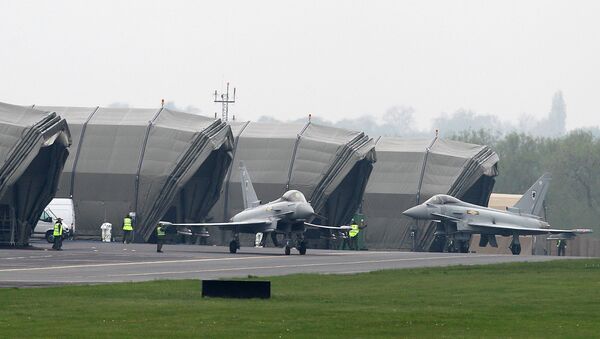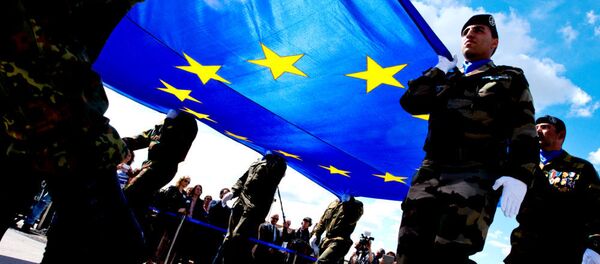That is why the increasingly cumbersome and bureaucratic pan-European hierarchy’s plans to fully engage the British military in its intended joint single army could be considered as the main challenge the country's armed forces face at the moment.
One Soldier Does Make a Battle
The United Kingdom has the fourth largest military budget in the world, by far outstripping all other European Union nations with $56.2 billion devoted to funding its army, according to the International Institute for Strategic Studies (IISS).
All of the above highlights that a British exit from the European Union might incur considerable costs for the bloc's defense capabilities.
According to Andrea Frontini, a policy analyst for Europe in the World Programme of the European Policy Centre (EPC), without British expertise and physical military strength the "EU might suffer greatly."
"As a matter of fact, the UK is one of the few European military weights which can still afford to cover most of the spectrum of military tasks, both in terms of territorial defense and expeditionary operations. Moreover, the UK has provided the EU with very valuable expertise in the planning and conduct of EU missions and operations, including in the field of civil-military cooperation," he told Sputnik.
Saving From Misery of EU Army
As media reports revealed last month, following the British vote Brussels intends to make its plans to create an EU army public. Later, Minister of State for the Armed Forces Penny Mordaunt confirmed that the United Kingdom would have to join the EU army if it were created under the Lisbon Treaty.
One of the strongest cases against British participation in such a formation has been made by Veterans for Britain, a group of retired senior British military officers. As the group's member Lt. Gen. Jonathon Riley, who served as deputy commander of NATO Forces in Afghanistan in 2007-2009 argues, British soldiers, sailors, airmen and marines should not be sent into danger "by a body over which we have no control, and which answers to none of us."
Similar ideas were voiced last week by Field Marshal Lord Charles Guthrie, former chief of Defence Staff, who said that Brexit would be "better" for UK defense since the creation of a joint European army "would cause an awful lot of duplication and waste huge sums of money."
"There are too many ministers, officials, HQs, generals, admirals and air marshals as it is…. It would be a signal disaster to have a European Army as rivals to NATO. I am concerned that the Army which I was in for 45 years could become very damaged and therefore less useful to our country," he told The Telegraph.
According to Lt. Col. Stuart Crawford, former director of Communications for the British Army and veteran of the Gulf War, "Lord Guthrie’s fear is that Britain’s military might be even more 'watered down' if an EU army, for example, was to be created."
"Personally I think it would be safe enough to have a foot in both camps, and indeed the military might be able to use a EU military commitment as a tool to bargain for more resources," Crawford told Sputnik, adding that NATO will remain the cornerstone of UK defense policy in any case.
Post-Brexit EU Security
Although the expected costs of Brexit for the European Union are high, its outcome could be considered partially beneficial for the bloc as it would make the prospects of deeper integration more feasible.
London has been consistently holding back the evolution of the European Union’s Common Security and Defence Policy (CSDP), and its self-imposed isolation could facilitate EU integration in the defense sphere, Andrea Frontini said.
"The UK is also one of the countries which have vetoed the enhancement of EU’s CSDP in the past few years, for instance on the issue of the EU standing headquarter, so Brexit would, in a way, ‘lighten’ the EU from London’s skepticism vis-à-vis the idea of a stronger CSDP," he told Sputnik.
France could be especially active in promoting deeper integration in a post-Brexit European Union as it would become the only major military power in the bloc and therefore may seek to substitute the cooperation with British partners that currently serve as the European Union's military backbone.
Border Controls to Ensure Safety
According to the Office for National Statistics, net migration to the United Kingdom in 2015 amounted to 333,000, with EU-only net migration accounting for major part of this number – there were some 184,000 arrivals from other EU member states. It should be noted that during the period 2010-2015, non-EU immigration to the United Kingdom fell by some 8 percent while EU migration rose by 51 percent.
In February, Iain Duncan Smith, who served at the time as the secretary of state for work and pensions, linked the surging arrivals from Europe to the terrorist threat. According to the former official, extremists potentially arriving to the European Union among the thousands of refugees from war-torn Middle Eastern countries could receive citizenship in other EU member nations and then exploit the lack of controls on intra-EU migration to carry out attacks in the United Kingdom.
"This open border does not allow us to check and control people who may come and spend time. We see what happened in Paris where they spent ages planning and plotting. Who is to say it is not beyond the wit of man that those might be already thinking about that," he told the BBC.
However, European Policy Centre's Andrea Frontini doubts that EU membership is a major factor driving terrorist attacks in European countries.
"Terrorism is rather a lethal combination of external propaganda and recruitment efforts by ISIS [Daesh] and other organizations, and endogenous factors in European societies, including lack of integration of Muslim communities," he told Sputnik.
Given the presence of radicalized individuals on its soil and its participation in the "coalition of the willing" fighting Daesh in Syria and Iraq, the United Kingdom is a country which is likely to remain a potential target for future terrorist attacks in the short term, irrespective of whether it is part of the European Union or not, the expert concluded.
Regardless the outcome of the British referendum on June 23, the country will still face a variety of security challenges. However, the vote may have a serious impact on the efficiency of the security policy pursued by the British government.






